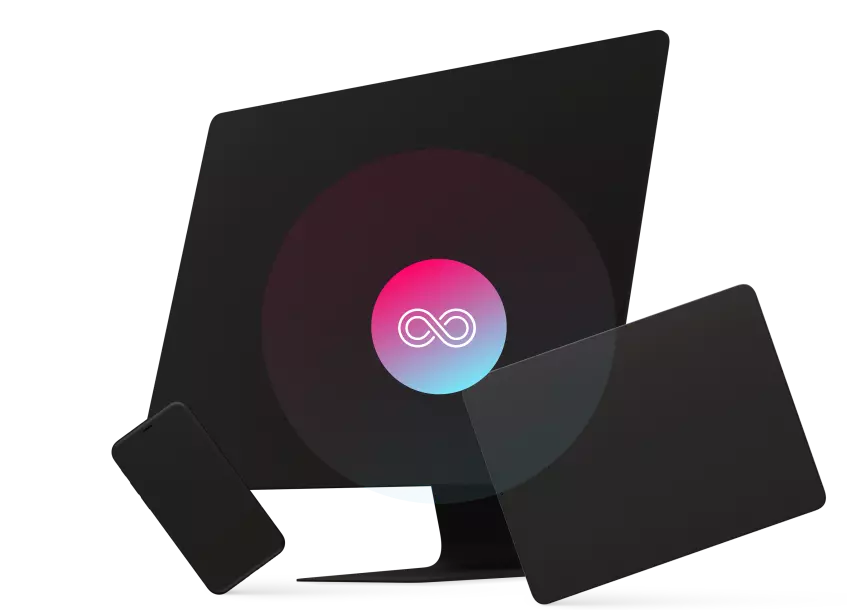
New York-based Urban VPN is a free VPN service, offering unlimited bandwidth for zero dollars… sort of, most of the time… Sorry for the confusion – it’s just that Urban VPN’s offering is hard to pin down.
While its marketing claims it’s a 100% free VPN, that’s not entirely true for a few reasons:
- Its mobile apps require a subscription.
- Even if you stick to the free desktop apps, you’re paying through all of Urban VPN’s data collection (and boy, does it collect A LOT of user data) while giving up a percentage of your bandwidth.
That’s because when you connect to an Urban VPN server, you’re actually connecting to a P2P network with all the other Urban VPN users, and your traffic is routed through other users’ connections (and other users’ connections are routed through yours). That’s how it can claim to offer a free service without bandwidth limits.
As mentioned above, while the desktop apps are genuinely free (in terms of money), if you want to use Urban VPN on mobile, you’ll get a seven-day free trial, but after that, you need to fork over some cash. The only benefit you’re getting for your money is that Urban VPN claims to collect less data from paid users (but it will still collect massive amounts of data).
So it’s a very liberal definition of free…
With that out of the way, let’s remain open-minded while we test Urban VPN’s offering.
 4
Core Highlights
4
Core Highlights
| Feature | Details |
| 📺 Streaming | Claims to unblock major platforms like Netflix, BBC iPlayer, and Amazon Prime Video, but I could not access any streaming services. |
| 💻 Devices | Unlimited devices |
| 🖥 Servers | Offers 82 servers in 82 countries |
| 🚄 Speed | Speeds are very poor. |
| 🔓 Privacy Policy | Collects an unacceptable amount of user data for a VPN service. |
| 🖧 Specialized Servers | None. |
| 📱 Compatibility | Windows, macOS, iOS, Android |
| 👩 Customer Support | No customer support. |
Urban VPN Overview
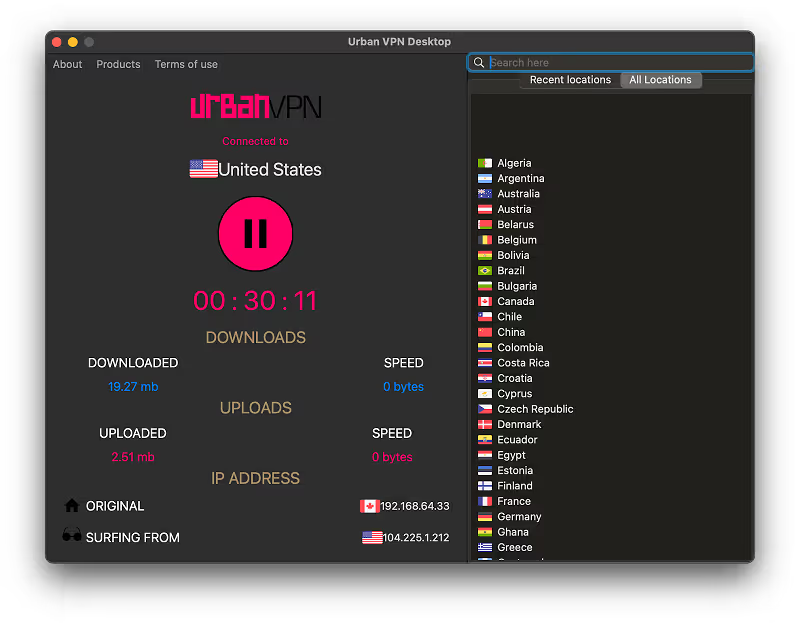
Advantages
- Free
- Allows for unlimited devices
- Offers browser extensions for Chrome, Firefox, and Edge.
Disadvantages
- Collects massive amounts of user data
- Shares your bandwidth with other users (P2P)
- Mobile apps cost money
- Terrible speeds
- Uninformative website
- No router support
- No kill switch
- Doesn’t support any features beyond the VPN and browser extensions
- Doesn’t unblock streaming sites
Needs improvement
- Everything
 1
Streaming
1
Streaming
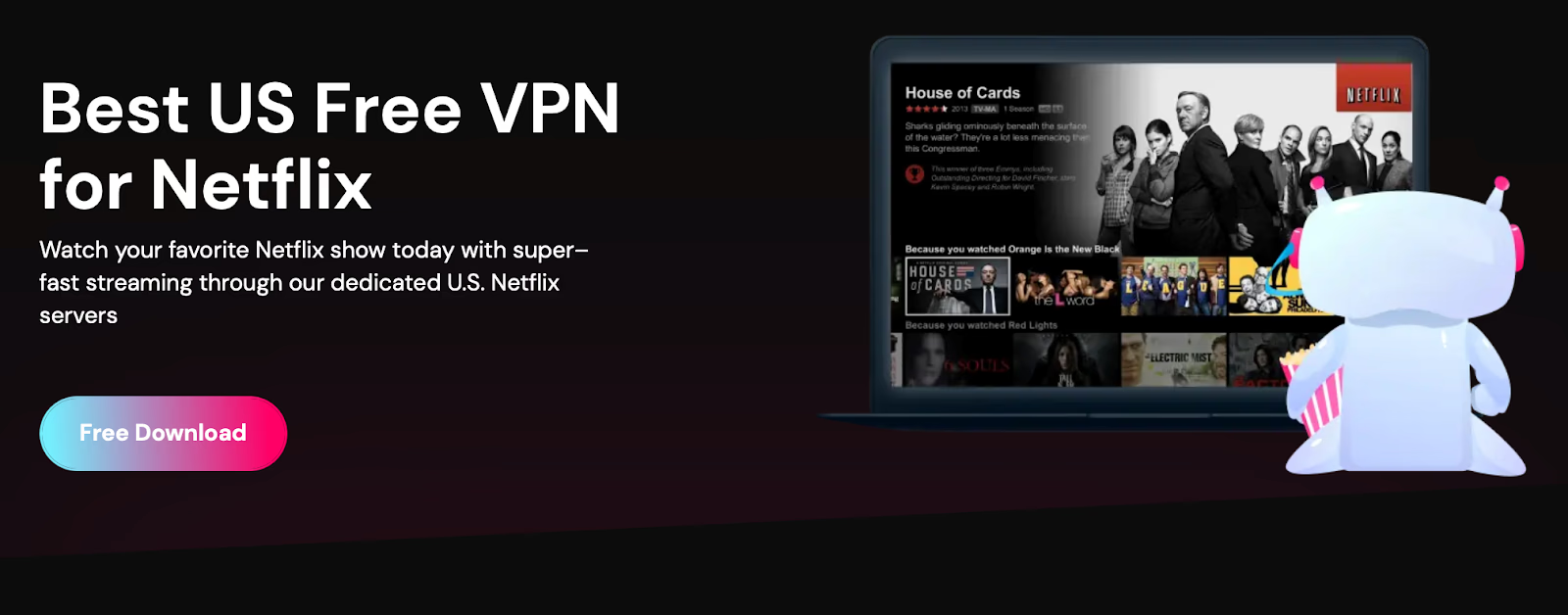
Streaming services are required to enforce geo-restrictions on the content they make available. That’s part of their agreement with the studios producing the content. That’s why streaming services started blocking VPN users. And with those blocking efforts increasing year-on-year, access to streaming sites over VPN has become a very coveted feature. That probably explains why streaming support is plastered all over Urban VPN’s website.
The reality, however, is rather disappointing. Using Urban VPN, I wasn’t able to access a single streaming site – in any region. I tried Netflix, Hulu, Disney+, BBC iPlayer. No matter the server/region, it simply never worked.
Part of the reason may be due to Urban VPN’s abysmal speeds. But, whatever the reason, it just doesn’t work.
If streaming over VPN is important to you, you definitely want to look elsewhere for your VPN provider. Reputable VPN providers with a good history for unblocking streaming sites would be, NordVPN, ProtonVPN, and Surfshark.
 7
Server Locations
7
Server Locations
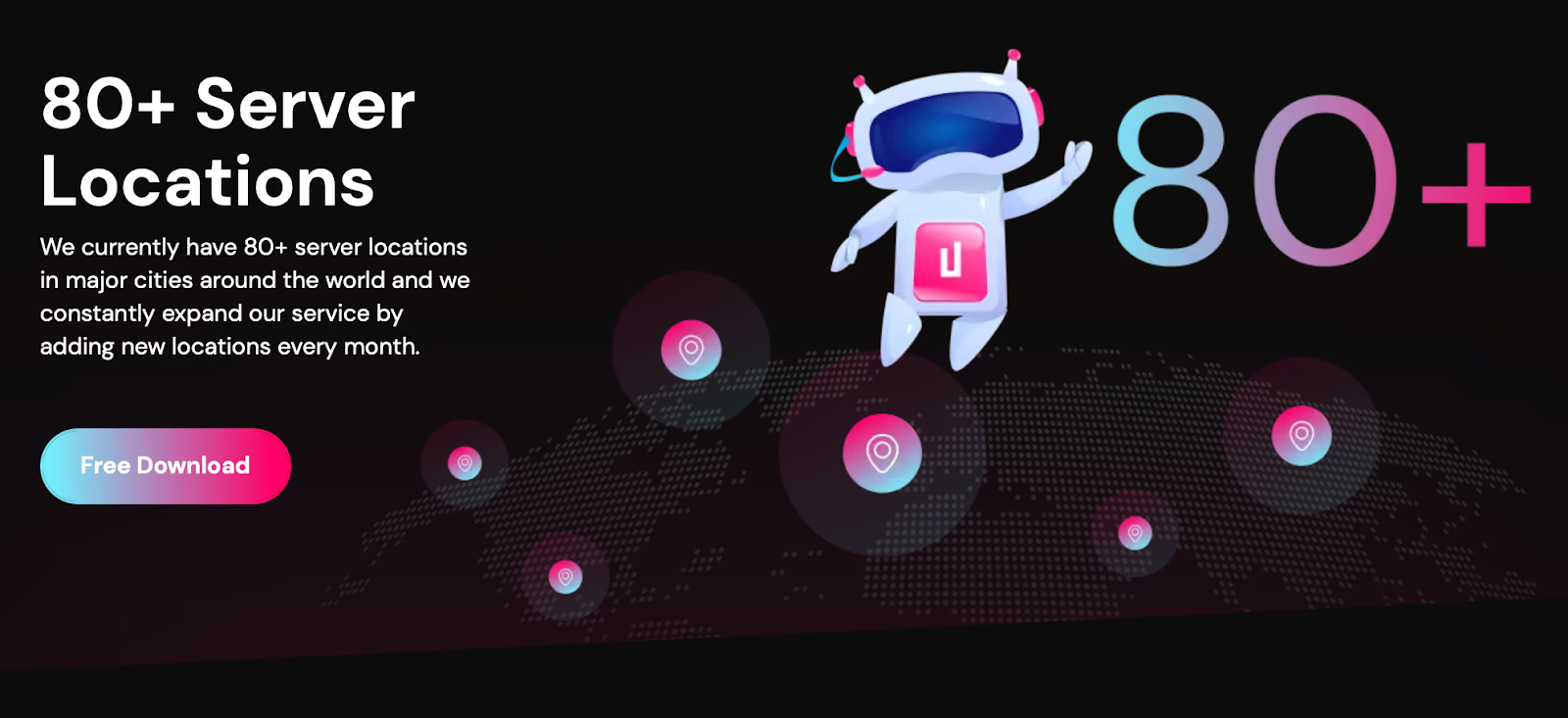
Urban VPN provides access to over 80 VPN servers – 82, to be exact. And while information about its service is scarce, it appears to offer a single server in each country (82).
While I’m usually a fan of smaller server lists when it comes to VPN providers (it makes me feel more care goes into their configuration), however, having a few different servers to choose from in each location is nice. Sometimes, you may want to change servers to get a performance boost without changing regions. That won’t be possible with Urban VPN.
Still, I feel that 82 servers is a good enough number. It’s just that if you need a massive server list from your VPN provider, again, you should look elsewhere.
 4
Torrenting
4
Torrenting
Many VPN providers offer dedicated servers for streaming and torrenting. Not Urban VPN. There’s no dedicated anything here – it’s an extremely basic service. And while torrenting works when using the service, its horrible speeds kill the experience.
Don’t get me wrong here, it does work. It just works poorly and slowly, with much lag and latency to be expected.
Urban VPN offers the bulk of its service for free, so the servers on offer have low throughput, making streaming and torrenting impractical and unreliable.
Urban VPN is not an optimal choice for either.
 2
Security, and privacy
2
Security, and privacy
Normally, when you write a VPN review, and you get to the “privacy and security” portion of the review, you’ll start by taking a look at the privacy and security features included in the provider’s app.
However, in Urban VPN’s case, there are no such options…
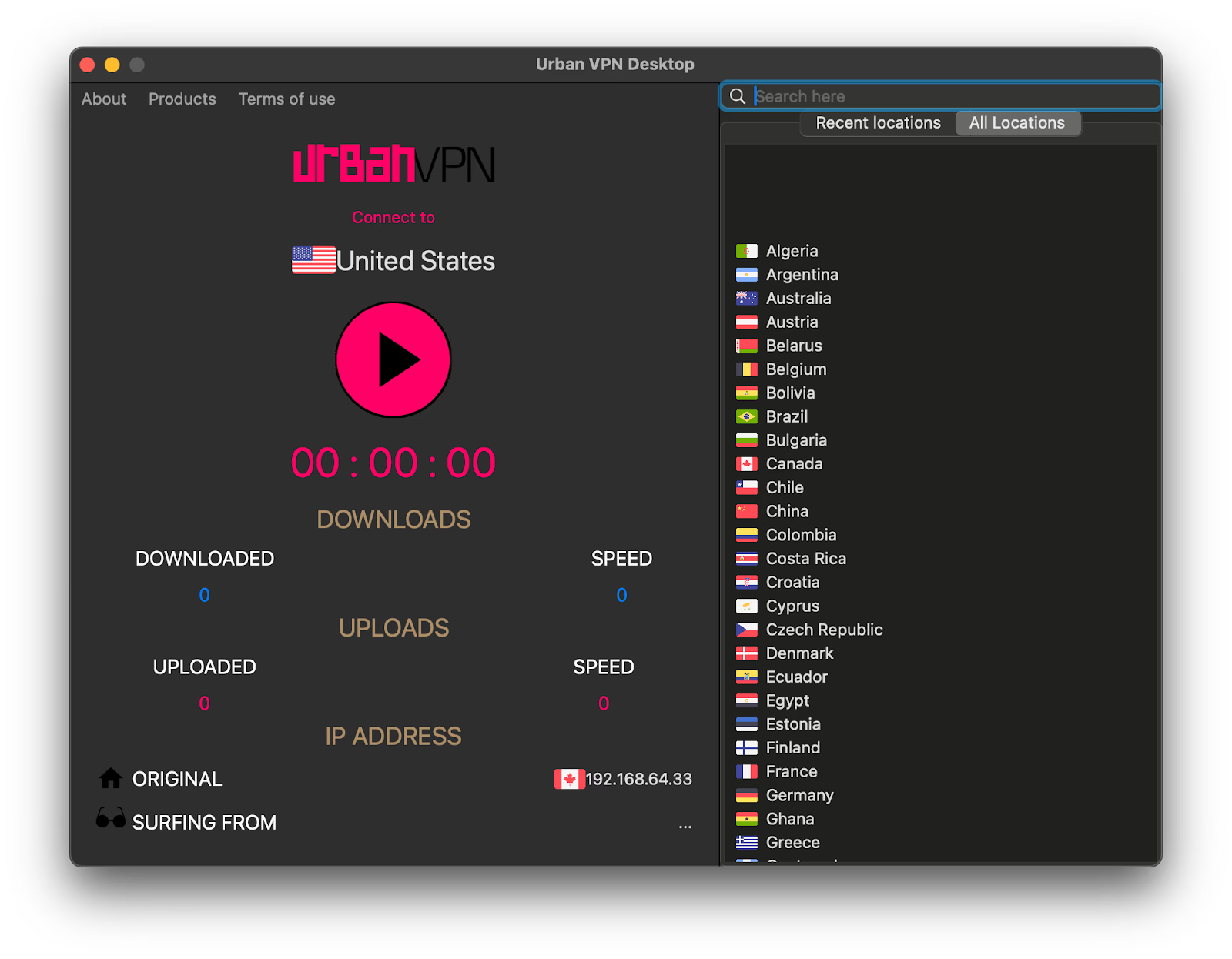
Is there a kill switch? No.
Is there a mechanism to automatically connect the VPN when online? No.
Is there a way to keep the VPN connected when the device goes to sleep? No.
Can you choose your VPN protocol? No.
Can you choose your encryption algorithm? No.
Let’s be clear: the app has absolutely no features besides the VPN connection itself.
Protocols
As I mentioned before, Urban VPN’s website provides very few details on how its service works. I was able to confirm – after a lot of digging around – that it uses the OpenVPN protocol with AES-256 encryption.
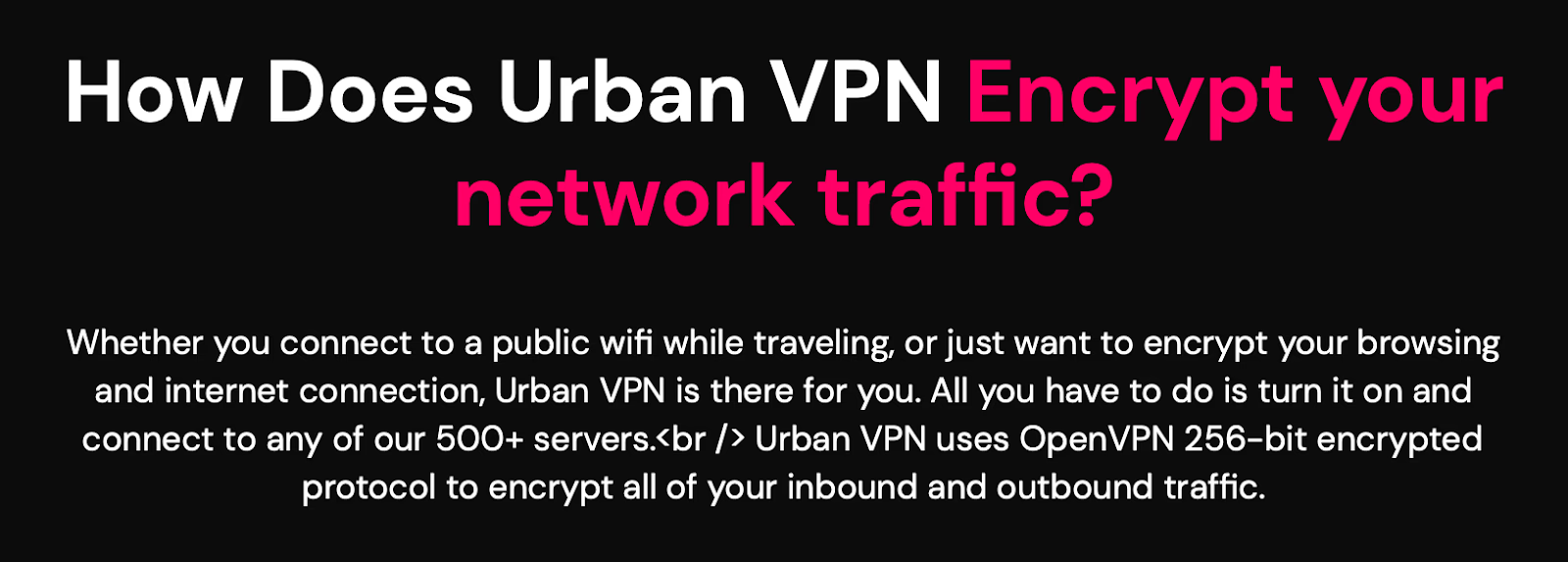
And that’s all you’re going to get regarding anything related to the service’s security features.
While nothing in this review so far would make a reasonable person want to use Uran VPN, its privacy policy is really the final nail in the coffin.
The amount of data Urban VPN collects from its users is quite simply mind-boggling. Urban VPN is a data-collectionVPN. Despite calling itself a VPN and waxing about internet freedom in its marketing, it is NOT a privacy service.
If you’re skeptical, just wait…
So, the first thing you’ll notice when you access Urban VPN’s privacy policy is how hard it is to read. It has these very narrow columns of text that force you to scroll and scroll in order to read them.
I created the graphic below by assembling three screenshots (apologies if it’s difficult to read). But on its website, this is all vertical…
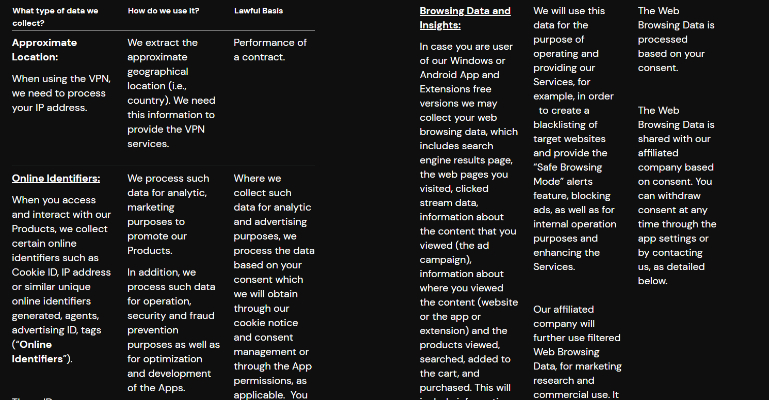
So, let’s go over some of the data Urban VPN collects. The above screenshot tells us that it collects:
- Your source IP address
- Your location
- Your device identifiers
- Your browsing data (!)
Feeling private and secure yet? Moving on.
Here’s with whom Urban VPN shares your data:

So, it shares your browsing data with an analytics firm that will process your data for “insights” (i.e., profiling users) and then sells those insights to… whoever is willing to pay for it.
Aren’t you glad you got a VPN for all that added privacy and security it provides?

The above tells you that it shares any and all data with its service providers. While there may be some legitimacy to this (to provide the service), the sheer quantity of data collected makes this problematic.
And, of course, if Urban VPN is sold to another entity, all your data is sold along with the company.
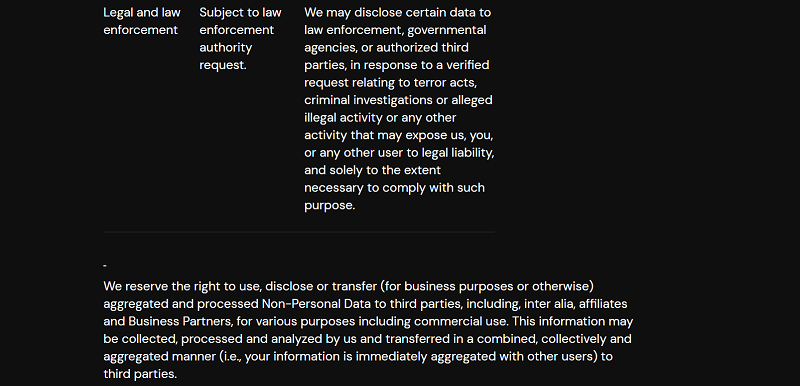
And you guessed it, if law enforcement comes knocking on Urban VPN’s door, it won’t stand up for you and will quickly comply. Of course, all companies need to comply with the law, including VPN providers.
But, a reputable VPN provider will have a robust no-logging policy in place and will take technical measures to prevent logging user data at all. So, if law enforcement demands data from a reputable provider, it will have nothing to share because it didn’t log those data points to begin with.
Needless to say, Urban VPN has no such no-logging policy in place, as the above privacy policy clearly lays out.
Moving on to IP and DNS leaks, I’m at least happy to report that I didn’t encounter any of these with Urban VPN.
Without Urban VPN:
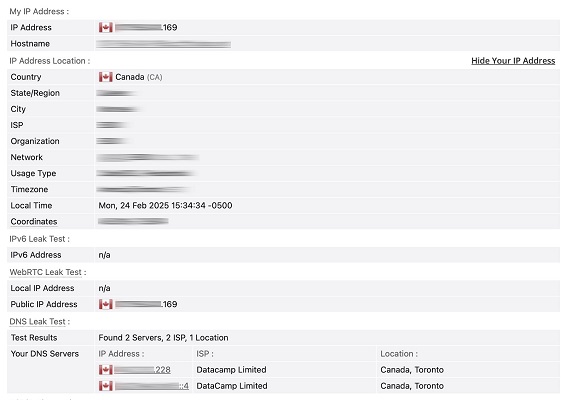
With Urban VPN:
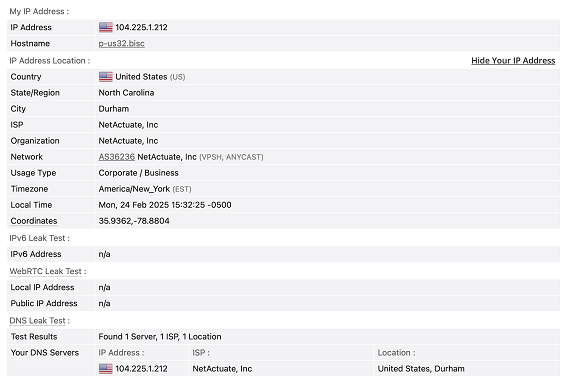
Again, technical details from Urban VPN are few and far between, but given these test results, I would assume Urban VPN is, like most VPN providers, configured to use in-tunnel, no-logging DNS servers.
This is recommended and should be the default with any VPN unless you need to use a specific DNS server to resolve internal domains, for example. But my advice to most VPN users is to use their provider’s internal DNS servers.
 3
Speed: How fast is UrbanVPN VPN?
3
Speed: How fast is UrbanVPN VPN?
Speed is a big deal when it comes to VPNs. Of course, you’re going to want a VPN that doesn’t drastically reduce your throughput and speed. But you need to keep in mind that every VPN will have a speed impact on your connection. And that’s because VPNs need to encrypt and decrypt your traffic as it flows from your device to the server and to the site/service you’re looking to access. Those operations add overhead to your connection, which translates to a speed dip.
Most VPN providers do a good job of optimizing their networks for the best speeds possible.
Not so with Urban VPN…
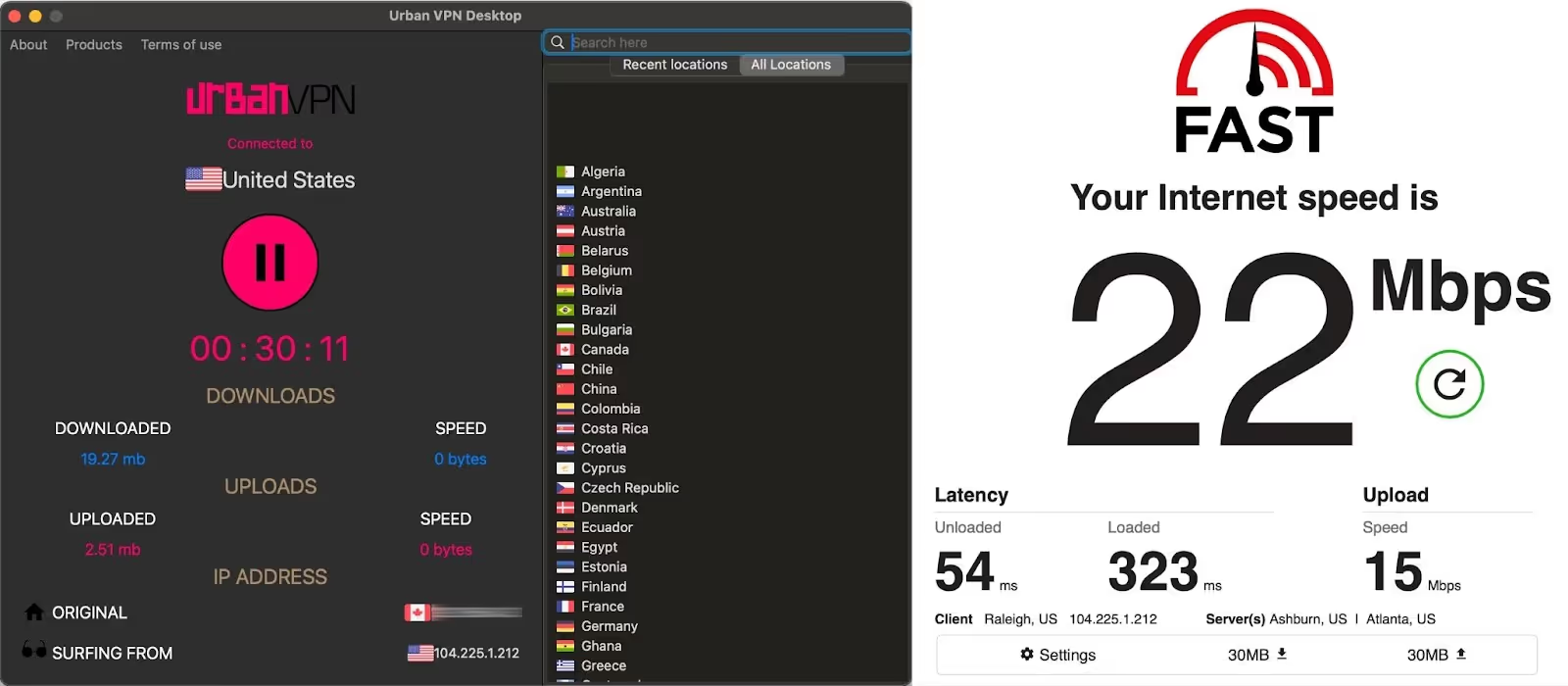
First, I usually use speedtest.net to perform my VPN speed tests. However, UrbanVPN’s connections don’t appear to work with that service. And that’s typically an indication of very poor performance.
It would just look for the “optimal server” forever.
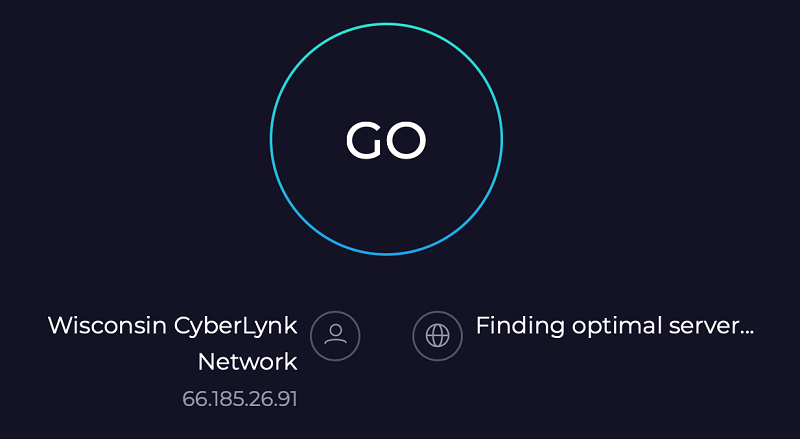
So, I had to turn to another service for my tests, which confirmed how poor Urban VPN’s speeds actually are.
Here’s my baseline (no VPN):
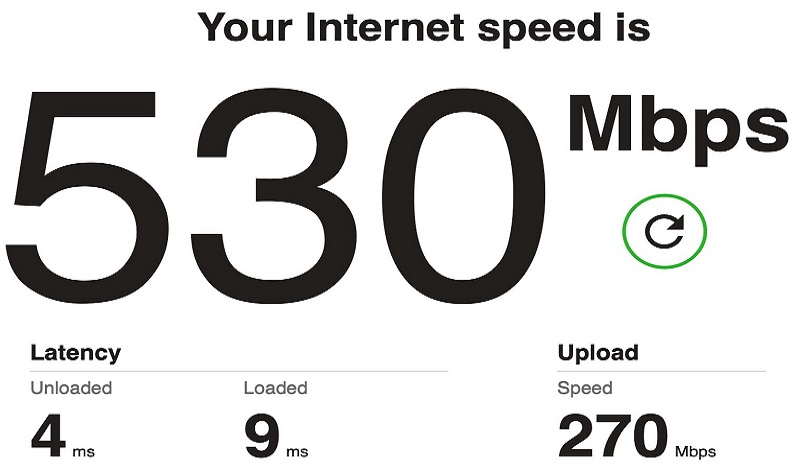
Here’s the result for North America (where I’m located):
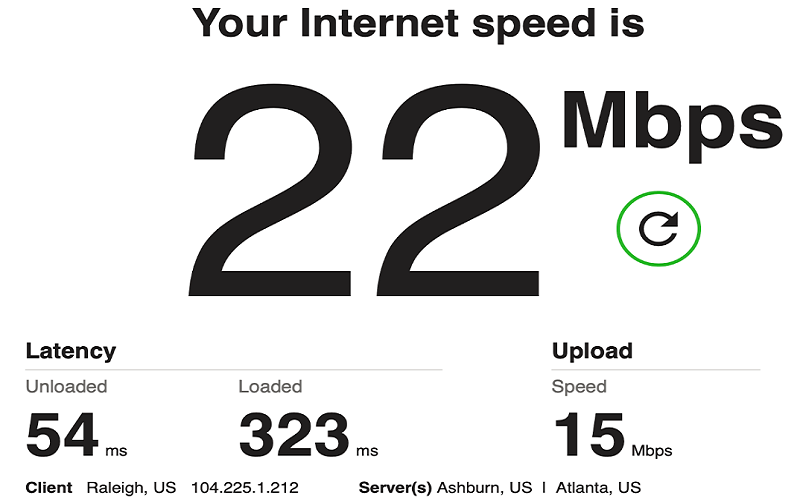
That’s a pretty big dip, wouldn’t you say?
Here are the rest of the results:
Europe:
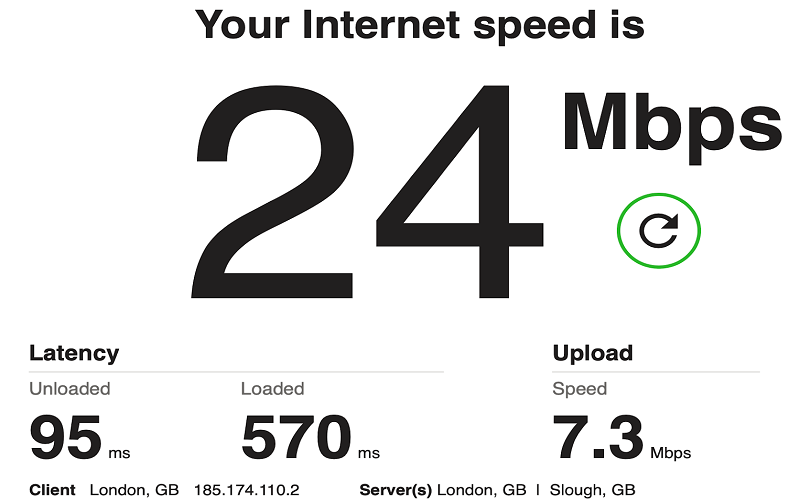
Asia:
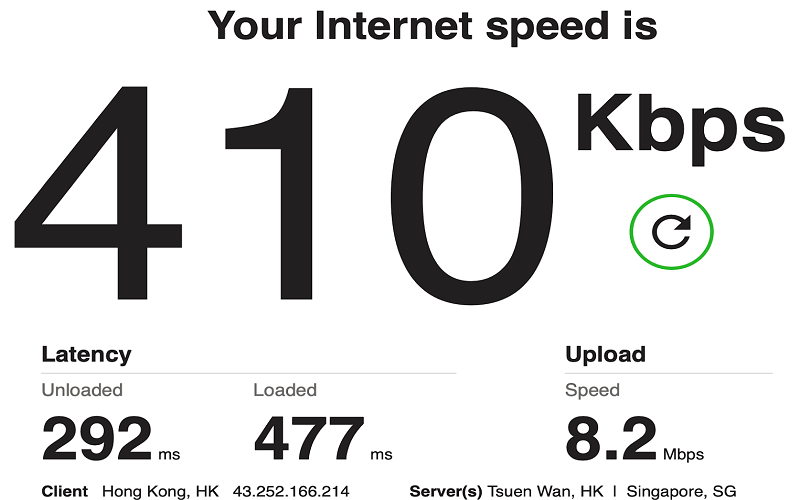
And yes, those are kilobits, not megabits…
Urban VPN’s speeds are quite terrible. I understand they’re not charging you money (though you pay in other ways), but given this performance, even if you don’t care about privacy, why would you decimate your internet connection this way?
 3
Gaming
3
Gaming
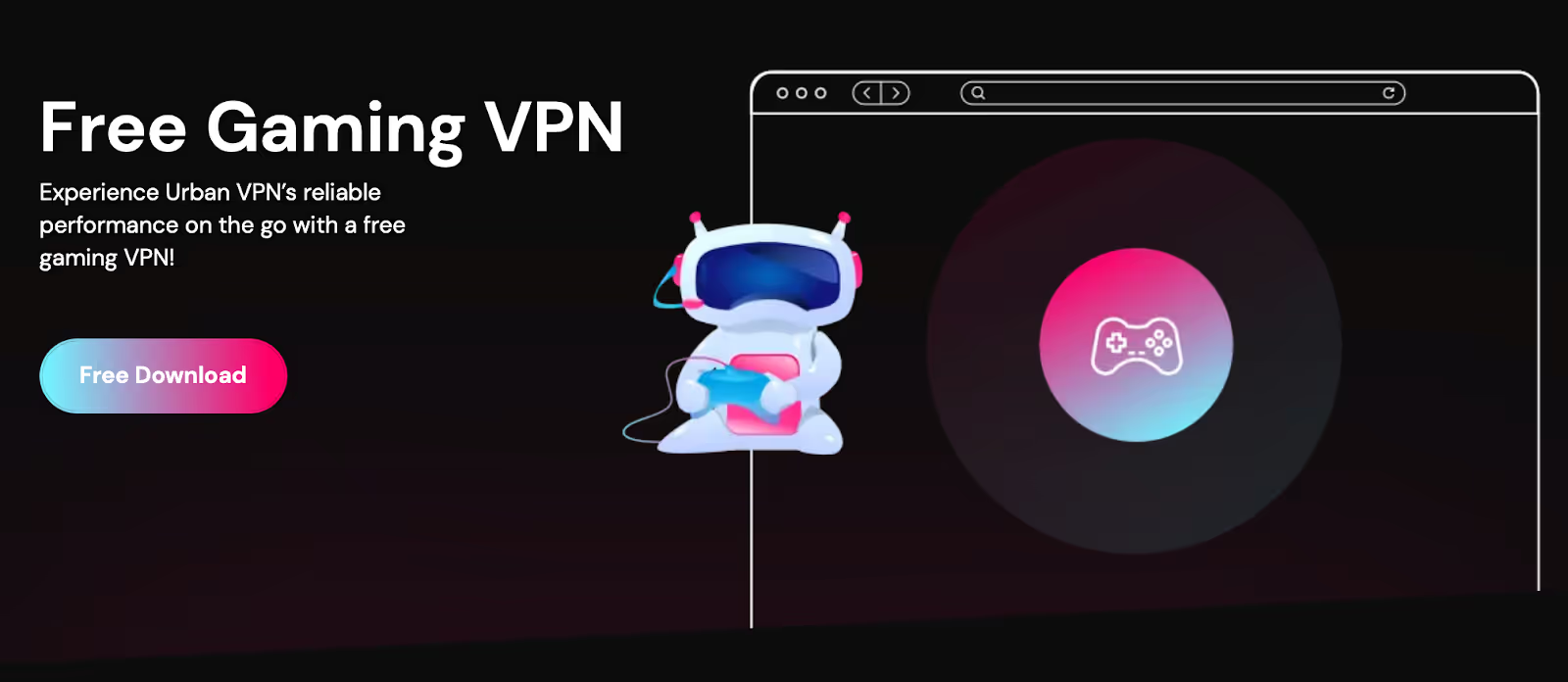
While my expectations were naturally low, at this point, I still tested Urban VPN with online gaming. And the results were… disappointing, though expected.
The best way to connect a gaming console to a VPN is through your router. Many routers support VPNs (typically, OpenVPN, WireGuard, or IPsec). With that setup, my PS5’s traffic is routed through the VPN simply by connecting to the router. It’s pretty simple and doesn’t require you to change any settings on the console.
However, Urban VPN doesn’t support routers (surprise, surprise), so this wasn’t possible. And that’s a shame because a wired connection is much better than WiFi for online gaming because of Ethernet’s lower latency.
My only option was to set up internet sharing from my Mac so as to share the VPN connection with my PS5. And while that worked, the performance was terrible – not because of my Mac’s internet sharing, but because of Urban VPN’s slow speeds and high latency.
In testing online gaming performance, I experienced a lot of lag and even disconnects. When trying to connect to other players, it would appear to load, then lag for minutes on end, terminate, and try again. That’s all I was able to achieve.
To be clear, it’s not uncommon to run into issues when gaming online over a VPN. A lot of things can impact performance, like how many users are on the same server, the available bandwidth on the server, and network conditions, to name a few. Normally, if you have issues with one server, you can try different ones and eventually find one with good performance – usually one close to your actual physical location.
With Urban VPN, regardless of the server I used, online gaming was a non-starter.
Urban VPN and routers
As I just mentioned, Urban VPN does not offer router support.
The two main benefits of VPN routers are:
- You can connect to the VPN service without using a dedicated app. You just connect to the router, and your traffic is tunneled through the VPN.
- You can connect as many devices as you want to the VPN router, which will only count as a single device as far as your VPN provider is concerned. So, if your provider places a cap on the number of simultaneous connections, you can exceed that number by using a VPN router.
However, given that Urban VPN offers unlimited connections, that last point is less critical.
 6
Apps: Supported platforms
6
Apps: Supported platforms

Urban VPN provides native applications for the following platforms:
- Windows
- macOS
- iOS
- Android
Those are the usual suspects – and that’s fine. But there’s no router support or Linux support.
I like providing a detailed app overview in my reviews but given how little functionality the app offers, there won’t be that many details to share.

The app is pretty basic.
On the left, you have the big “connection” button to connect to the VPN server you selected from the list on the right. Once connected, information on your connection is displayed under the “connection” button. Neat.
Other than that, you can filter the server list to only show the servers you’ve connected to in the past by clicking the Recent locations button.
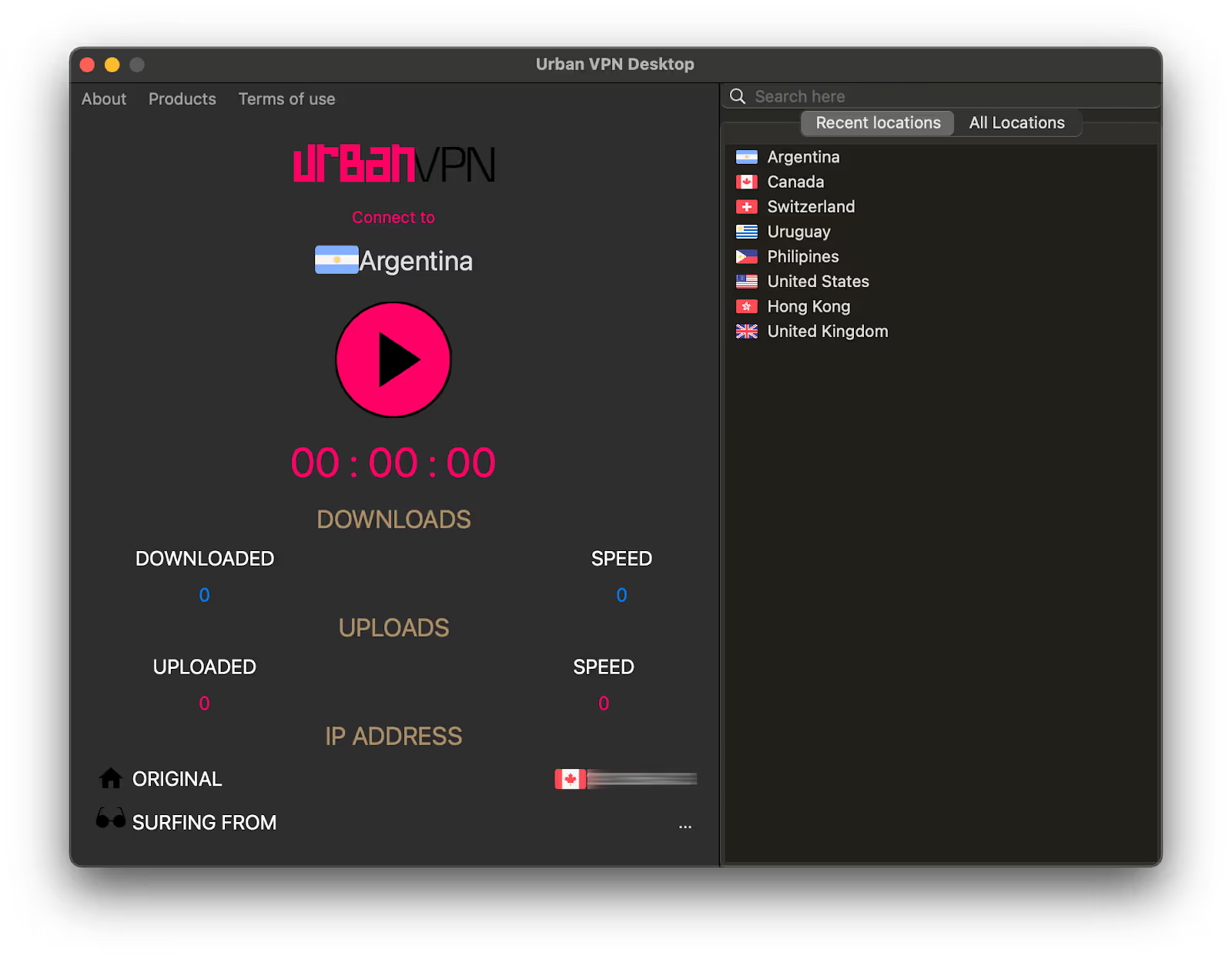
The only other things you can interact with in the app are the About, Products, and Terms of use links at the top left of the app. All these do is take you to a section of Urban VPN’s website.
And that’s it. The app doesn’t even have a Settings section. Not even in the top menu bar.
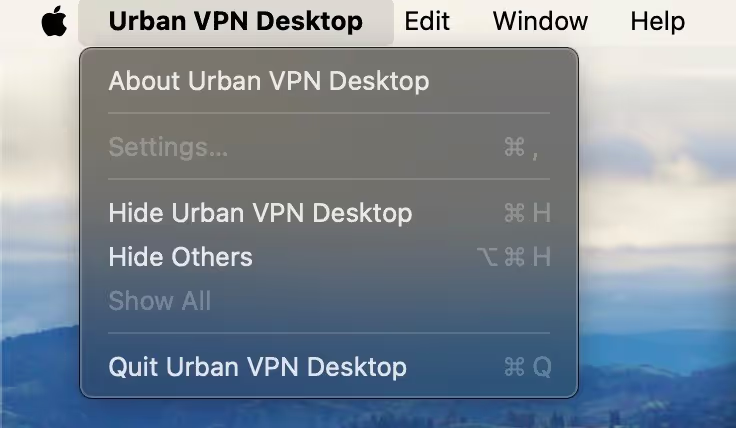
You might think there’s one, given that Settings… is in the list. But no, it’s greyed out, and there’s nothing you can do to change that.
Aside from its app, Urban VPN does offer a browser extension for Chrome, Firefox, and Edge. This is not included in the app when you download it and needs to be installed separately if you want it.
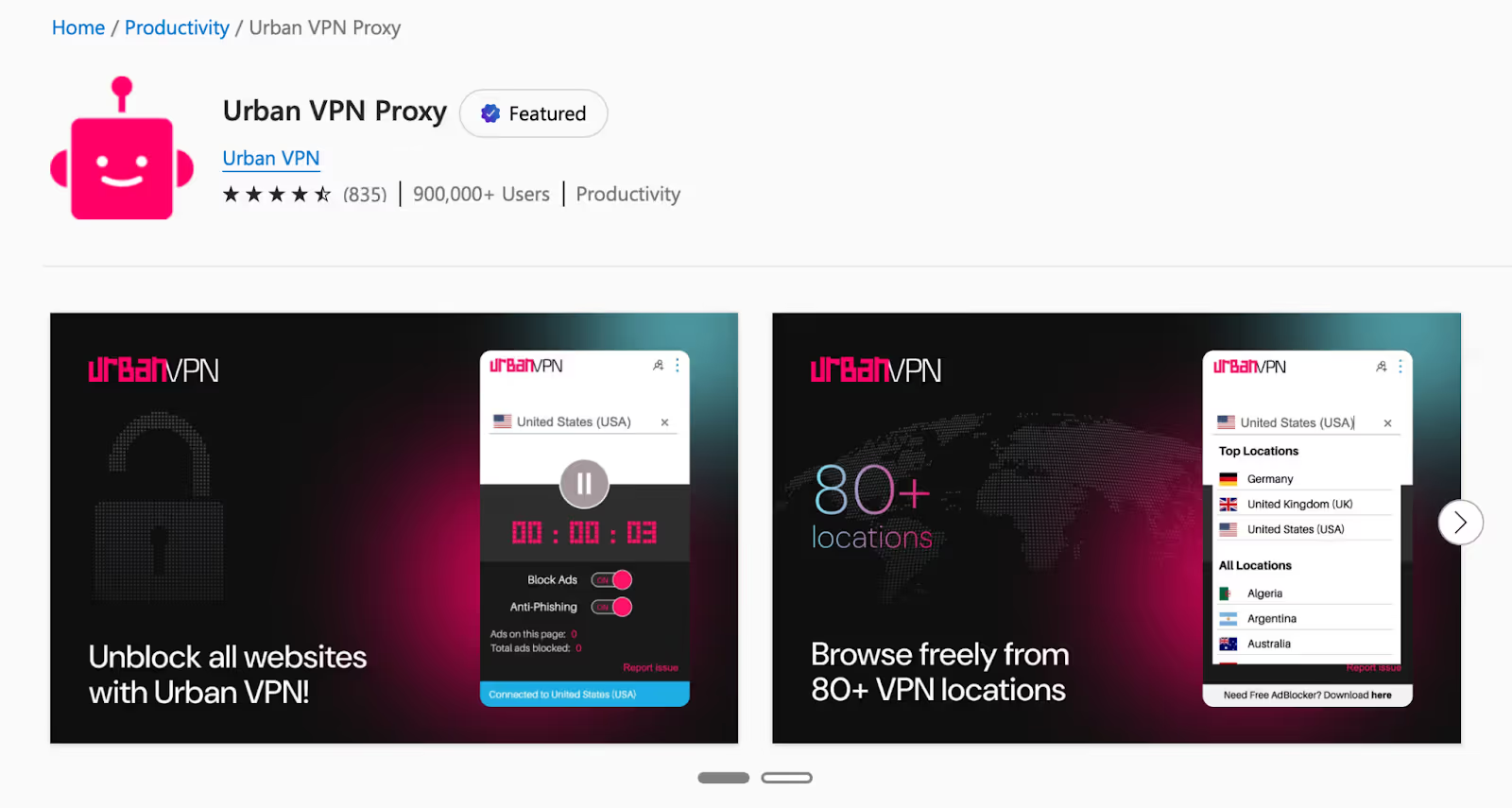
While I don’t have anything against browser extensions, it’s critical to remember that a browser extension will only tunnel your browser’s traffic through the VPN. All other apps keep using your default ISP connection.
The only other thing on offer is an ad-blocking extension for Chrome.
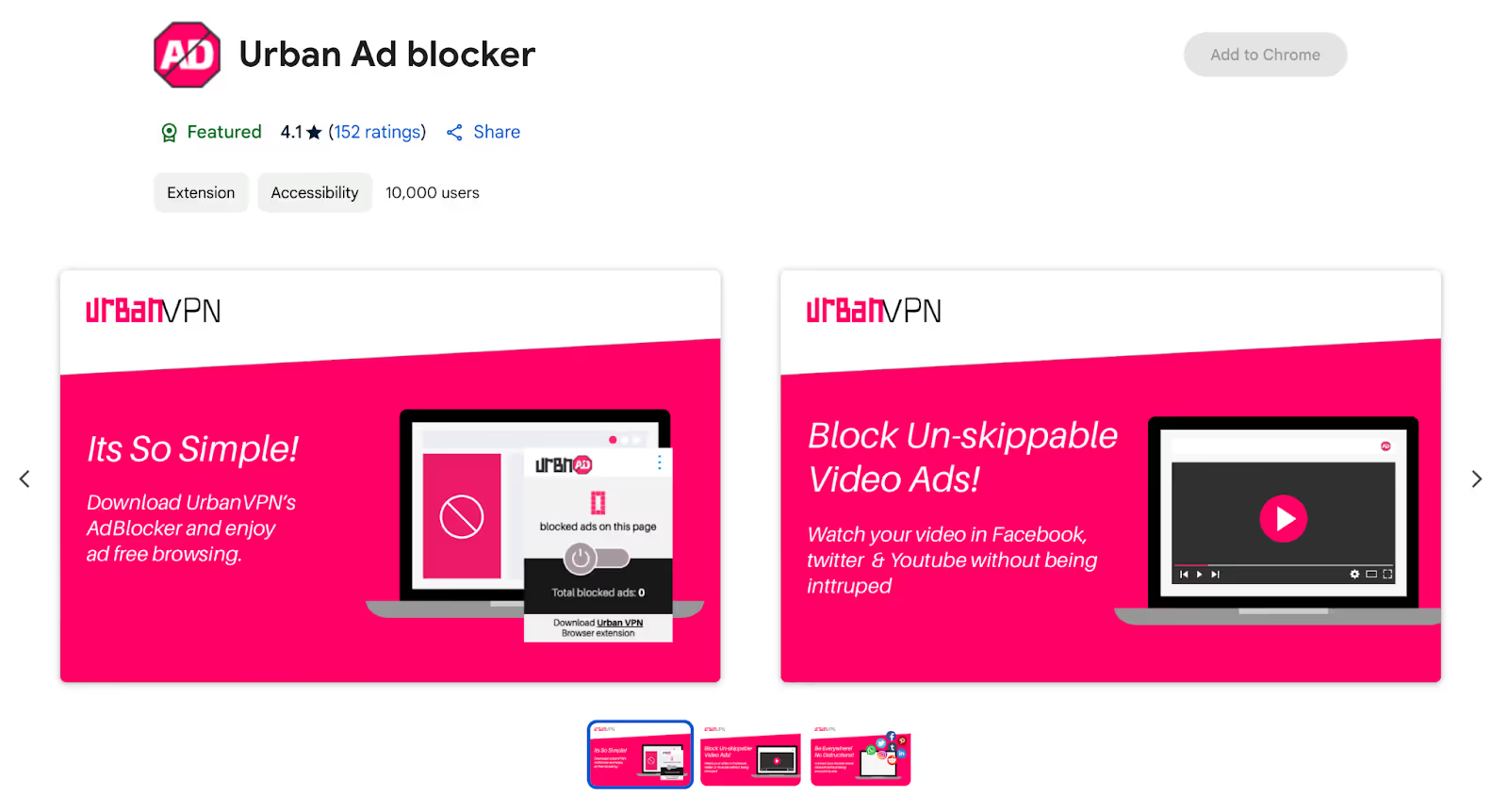
 6
Pricing
6
Pricing
It’s kind of funny to have a Pricing section in a review for a free VPN. But that’s because only its desktop apps are free. If you want to use Urban VPN on mobile, you’ll get seven days free, and then you need to pay. And Urban VPN claims to collect less data from paying mobile users than its free desktop users. Although what that actually means is not specified, take that with a nice heaping of salt.
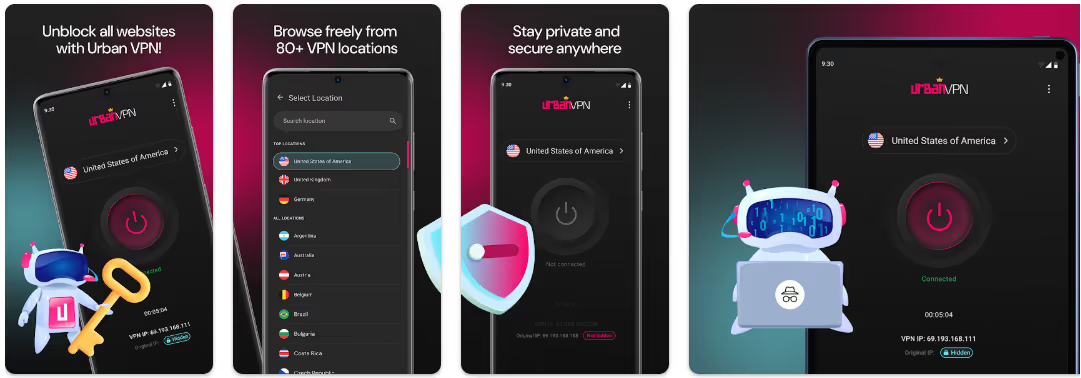
So what do Urban VPN’s mobile plans cost?

So, Urban VPN offers a monthly, yearly, and 3-year option.
Monthly: $10.99/month
One year: $3.33/month – works out to $39.96/year
Three years: $2.36/month – works out to $28.32/year and $84.96 for the three years
Those aren’t bad prices. But given Urban VPN’s poor performance, those prices aren’t worth what you get in exchange. Not only that, while Urban VPN’s prices aren’t terrible, they’re higher than what you would pay for a premium VPN service, like NordVPN or Surfshark.
 6
Customer Support
6
Customer Support
Urban VPN doesn’t provide a link to customer support in its app. Given that the majority of its users are not paying customers, it probably doesn’t want to advertise its support resources too much. Fair enough.
It does provide an online knowledge base.

And a FAQ with the answers to the most common questions users are likely to have.

I was also able to find an online email support form using a search engine, but was unable to get there from Urban VPN’s website.

I wrote to Urban VPN’s support team asking for details about their VPN protocol and haven’t gotten a reply… I’m not a paying customer, so I doubt I’ll get one.
Do I recommend Urban VPN?
Nope. Not at all.
First of all, let’s be clear: while VPNs have branched out to include more and more “convenience” features like streaming support and split tunneling, the main reason why VPNs exist is to provide a measure of privacy and security to your online activities. They make it so you’re harder to uniquely identify online and that makes you harder to track.
With Urban VPN (and pretty much every other free VPN out there), everything is upside down. With Urban VPN, your VPN provider isn’t shielding you from online tracking and profiling, it’s doing the tracking and profiling itself!
Given its business model, you’re better off not using a VPN at all and allowing your ISP to track you – it probably does so less than Urban VPN and is likely to share its “insights” with fewer “partners.”
And when you add Urban VPN’s terrible speeds to the equation, using the service makes even less sense. Why would you use a VPN that reduces your speeds by 95% while tracking your online activities? That’s like trying to put out a fire by pouring gasoline on it – you’re making a bad situation worse.
Then, we have the fact that Urban VPN provides essentially zero features beyond its VPN. So, there’s no kill switch, split tunneling, or on-demand connections. And it also advertises features that it doesn’t really support, like streaming and torrenting. Streaming didn’t work at all (no surprise, given the performance). And while torrenting technically worked, insofar as I was able to launch my torrent client and attempt to download a file, the connection was so bad as to make the whole endeavor pointless.
Are there any positives? Well, the service (on desktop) is free in terms of money. But you’re paying with your data. It also allows for unlimited simultaneous connections. But again, that just caters to Urban VPN’s thirst for data. It simply wants to track you across as many devices as possible. So, while it can seem to be a nice feature, it’s really just an invitation for tracking.
The bottom line is that Urban VPN may well be the worst VPN provider I’ve ever encountered. So, it at least ranks number 1 in that category.
Given how inexpensive a high-quality, reputable VPN service is these days, there’s simply no reason to go for Urban VPN, whether free or not.
Urban VPN is not recommended at this time. And without major changes to its business model and infrastructure, it never will be. If you really want a free VPN, try Windscribe or ProtonVPN – they provide better speeds, security, and privacy.
Urban VPN - Reddit Reviews
Urban VPN is a free VPN service advertised for bypassing geo-blocks, but Reddit users have mixed opinions about its safety, speed, and reliability. Discussions highlight concerns about privacy risks, performance issues, and the limitations of free VPN services.
Key Takeaways from Reddit Users
Reddit Opinions on Privacy & Security
Urban VPN receives mixed reviews regarding security. While some users find it useful for light browsing, others report data leaks and privacy concerns.
“Checked my IP after connecting, and it still showed leaks. Wouldn’t trust this for privacy.”
Many Reddit users worry that free VPNs, including Urban VPN, may log and monetize user data despite their claims.
Read the entire Reddit discussion: Reddit thread on Urban VPN privacy concerns.
Urban VPN & Torrenting: Is It Safe?
Most Reddit users do not trust Urban VPN for torrenting due to slow speeds, frequent downtime, and privacy risks.
“Tried torrenting with a free VPN once—never again. Speeds were terrible, and I didn’t feel safe.”
While some users believe any VPN can help avoid ISP warnings, they caution that free VPNs often lack absolute security.
Read the entire Reddit discussion: Reddit thread on Urban VPN for torrenting
Urban VPN for Xbox & Microsoft Region Changes
Reddit users report difficulties using Urban VPN to redeem Xbox codes or change regions, with many suggesting Microsoft actively blocks free VPNs.
“Tried using a Turkey IP for an Xbox code, but it didn’t work. Microsoft seems to be blocking free VPNs.”
Users recommend alternative services that work better for region changes.
Read the entire Reddit discussion: Reddit thread on Urban VPN & Xbox issues.
Why Do Free VPNs Get Criticism?
Many Reddit users prefer paid VPNs over free ones like Urban VPN due to common limitations:
- Data caps (usage limits).
- Slow speeds (especially for streaming and gaming).
- Privacy risks (some free VPNs sell user data).
“If a VPN is free, you’re probably the product. Always check the logging policy.”
Read the entire Reddit discussion: Reddit thread on free VPN concerns.
🔹 Suggested alternatives: ProtonVPN (no logs, better security), Windscribe (10GB/month limit), SoftEther VPN (good for Japan servers), Mullvad (privacy-focused)
FAQ
It depends on what you mean by “safe.” My testing showed no IP or DNS leaks when using Urban VPN. So, if that’s what we mean, then yes, it’s safe. However, while your original IP and DNS requests won’t leak outside of Urban VPN’s tunnel, Urban VPN itself is profiling you and collecting your original IP address and DNS requests (and every other part of your web traffic). So, no, Urban VPN is not safe. It engages in the collection activities you would typically use a VPN to avoid.
Again, that’s going to depend on the definition of free. Urban VPN’s desktop apps are genuinely free (in terms of dollars). But given the provider’s business model and logging practices, you’re paying by sharing your bandwidth with other Urban VPN users (P2P network) and with your online data (which Urban VPN collects).
Also, its mobile apps require a paid subscription – so those aren’t free in terms of dollars, data, or bandwidth.
Urban VPN does allow torrenting. It just doesn’t work very well for torrenting (or anything else, really). So, when connected to Urban VPN, you can absolutely launch your P2P client and download as many torrent files as you like. It will be ridiculously slow, and you’ll probably give up on it as your downloads stall.
Another reason to avoid Urban VPN for torrenting is that the service doesn’t provide a kill switch. If you let your torrents run unattended, your VPN may disconnect, and if that happens, your torrent traffic will be going over the internet using your ISP connection – which is not ideal.
Urban VPN is based in the United States – in New York, to be exact. And while the United States doesn’t have mandatory data collection laws, Urban VPN chooses to collect massive amounts of data on its users. That means that if law enforcement requests user data from Urban VPN, they have no choice but to hand over the troves of data it collected on you (and in Urban VPN’s case, its privacy policy makes it clear it won’t even try and resist, it will gleefully comply).
The only way to operate a proper VPN service from the United States is to adhere to a robust no-logging policy and take technical measures to make sure the provider’s infrastructure doesn’t log any user data beyond what’s required for services rendered.


